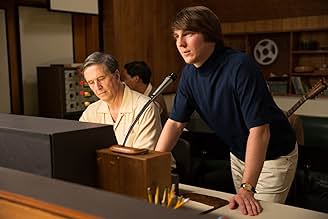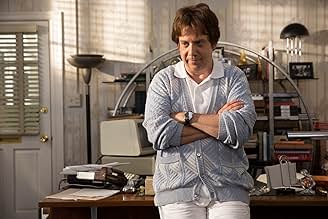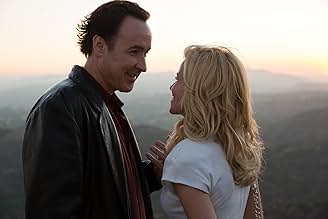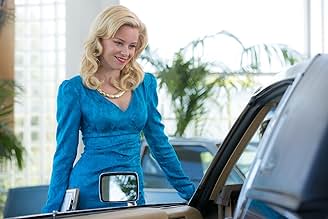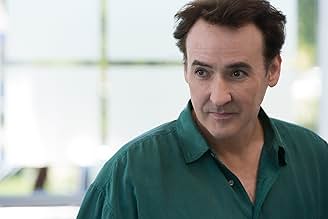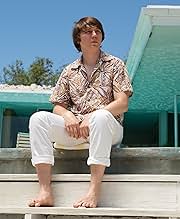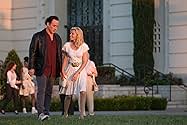In the 60s, Beach Boys leader Brian Wilson struggles with emerging psychosis as he attempts to craft his avant-garde pop masterpiece. In the 80s, he's a broken, confused man under the 24-hou... Read allIn the 60s, Beach Boys leader Brian Wilson struggles with emerging psychosis as he attempts to craft his avant-garde pop masterpiece. In the 80s, he's a broken, confused man under the 24-hour watch of shady therapist, Dr. Eugene Landy.In the 60s, Beach Boys leader Brian Wilson struggles with emerging psychosis as he attempts to craft his avant-garde pop masterpiece. In the 80s, he's a broken, confused man under the 24-hour watch of shady therapist, Dr. Eugene Landy.
- Director
- Writers
- Stars
- Awards
- 20 wins & 58 nominations total
- Director
- Writers
- All cast & crew
- Production, box office & more at IMDbPro
Featured reviews
Personal genius has been brilliantly portrayed in film before: "A Beautiful Mind" for maths; "Amadeus" for classical music; and more recently "A Theory of Everything" for cosmology. Behind such genius is often a degree of dysfunction, if not borderline madness.
Here with "Love and Mercy" we get an insight into the creative churning of Wilson's tortured mind. But it is very much a time-banded view, focused on two key periods of his life: 1966, with Paul Dano ("12 Years a Slave"; "Looper") playing Wilson, and the 1990's where Wilson – severely drug-damaged, mentally ill and now played by John Cusack - is being taken for a ride by an unscrupulous and dangerous psychiatrist, Dr Eugene Landy (Paul Giamatti). Playing a key role in his recovery is car saleswoman Melinda Ledbetter (Elizabeth Banks) who Wilson desperately latches onto as a drowning man might grab a life-vest.
Whilst the film could be described as a game of two halves, this is not how it is played out. We jump between both eras without warning, which works extremely well in maintaining the interest in the two parallel stories.
In biopic terms, the 60's segments are probably the more gripping, providing a riveting insight into the production techniques of the iconic "Pet Sounds" album, frequently cited as one of the most innovative and creative albums ever released. The film also features superbly recreated 'old footage' (cinematography by Robert D. Yeoman) showing Beach Boy TV slots and video productions. Wilson's genius is neatly reflected through the admiration of the session musicians: they'd "played with them all" – Sinatra, Presley, Sam Cooke, etc – but Wilson was something else entirely.
Paul Dano is just superb as the troubled youngster, physically and mentally abused by his father (an excellent Bill Camp) and exhibiting mental instability even before the dangers of LSD become evident. His slide into near insanity is brilliantly reflected in an audio soundscape that merges snatched Beach Boy fragments and natural sounds into a cacophony. If Edward Tize and his sound department doesn't get nominated for an Oscar for Best Sound Mixing there is no justice in the world.
In the 90's segments, Cusack delivers his best performance in years as the older Wilson. And after being rude about Elizabeth Banks' directing skills for "Pitch Perfect 2", I feel I have to express my admiration for her portrayal of perplexed astonishment as Melinda, a woman with a mission. Both extremely subtle and utterly enjoyable performances.
In contrast, the excellent Giamatti seems rather over the top as the scheming Landy, although internet articles suggest that it is a scarily accurate portrayal of the degree of control he exerted.
Directed by Bill Pohlad (someone normally found in the production office), it's difficult to fault such a lovingly crafted film. The pre-credits reference to a 'building scream' (I assume relating to the 'goose-bumpy' bit of "Good Vibrations") is never resolved. And (as I rather missed it in the film) the motives for Landy's extreme actions are a bit obscure (in reality, the Wilson family later discovered he was named as a 70% beneficiary in Wilson's will). However, this film, which deserved a broader and better-publicised release, stands as a superb tribute to an iconic musician and comes with a "highly recommended" from me.
(If you enjoyed this review, please see the illustrated version at bob-the-movie-man.com and enter your email address to receive future reviews. Thanks).
Here with "Love and Mercy" we get an insight into the creative churning of Wilson's tortured mind. But it is very much a time-banded view, focused on two key periods of his life: 1966, with Paul Dano ("12 Years a Slave"; "Looper") playing Wilson, and the 1990's where Wilson – severely drug-damaged, mentally ill and now played by John Cusack - is being taken for a ride by an unscrupulous and dangerous psychiatrist, Dr Eugene Landy (Paul Giamatti). Playing a key role in his recovery is car saleswoman Melinda Ledbetter (Elizabeth Banks) who Wilson desperately latches onto as a drowning man might grab a life-vest.
Whilst the film could be described as a game of two halves, this is not how it is played out. We jump between both eras without warning, which works extremely well in maintaining the interest in the two parallel stories.
In biopic terms, the 60's segments are probably the more gripping, providing a riveting insight into the production techniques of the iconic "Pet Sounds" album, frequently cited as one of the most innovative and creative albums ever released. The film also features superbly recreated 'old footage' (cinematography by Robert D. Yeoman) showing Beach Boy TV slots and video productions. Wilson's genius is neatly reflected through the admiration of the session musicians: they'd "played with them all" – Sinatra, Presley, Sam Cooke, etc – but Wilson was something else entirely.
Paul Dano is just superb as the troubled youngster, physically and mentally abused by his father (an excellent Bill Camp) and exhibiting mental instability even before the dangers of LSD become evident. His slide into near insanity is brilliantly reflected in an audio soundscape that merges snatched Beach Boy fragments and natural sounds into a cacophony. If Edward Tize and his sound department doesn't get nominated for an Oscar for Best Sound Mixing there is no justice in the world.
In the 90's segments, Cusack delivers his best performance in years as the older Wilson. And after being rude about Elizabeth Banks' directing skills for "Pitch Perfect 2", I feel I have to express my admiration for her portrayal of perplexed astonishment as Melinda, a woman with a mission. Both extremely subtle and utterly enjoyable performances.
In contrast, the excellent Giamatti seems rather over the top as the scheming Landy, although internet articles suggest that it is a scarily accurate portrayal of the degree of control he exerted.
Directed by Bill Pohlad (someone normally found in the production office), it's difficult to fault such a lovingly crafted film. The pre-credits reference to a 'building scream' (I assume relating to the 'goose-bumpy' bit of "Good Vibrations") is never resolved. And (as I rather missed it in the film) the motives for Landy's extreme actions are a bit obscure (in reality, the Wilson family later discovered he was named as a 70% beneficiary in Wilson's will). However, this film, which deserved a broader and better-publicised release, stands as a superb tribute to an iconic musician and comes with a "highly recommended" from me.
(If you enjoyed this review, please see the illustrated version at bob-the-movie-man.com and enter your email address to receive future reviews. Thanks).
This is the story of Brian Wilson during two time periods. In 1964, Brian Wilson (Paul Dano) has a panic attack and quits touring with the band. Instead he concentrates on writing for the new record Pet Sounds. He struggles from his abusive father and starts hearing voices. In the 80s, Brian (John Cusack) is under the control of his therapist Dr. Eugene Landy (Paul Giamatti). He buys a car from saleswoman Melinda Ledbetter (Elizabeth Banks) who eventually breaks Landy's hold on him.
This is a compelling biopic of an interesting person. Paul Dano really hits it out of the park. His section has some great scenes. On its own, John Cusack does a great job. Put together, I can't help but think that Cusack is doing a passable imitation of Dano's performance. I'm not judging their relative acting skills. I just think that Dano has always played this type of character and he simply fits better. I'm certain that Dano would be nominated for an Oscar if he played both time periods. Landy is the villain of the piece and Giamatti plays him with gusto. For a more nuanced character, the movie needs to show his character saving Brian at the beginning. Splitting the time period so neatly does lessen some important sections of Brian's life.
This is a compelling biopic of an interesting person. Paul Dano really hits it out of the park. His section has some great scenes. On its own, John Cusack does a great job. Put together, I can't help but think that Cusack is doing a passable imitation of Dano's performance. I'm not judging their relative acting skills. I just think that Dano has always played this type of character and he simply fits better. I'm certain that Dano would be nominated for an Oscar if he played both time periods. Landy is the villain of the piece and Giamatti plays him with gusto. For a more nuanced character, the movie needs to show his character saving Brian at the beginning. Splitting the time period so neatly does lessen some important sections of Brian's life.
Brian Wilson's story is worthy of a movie. Neither his creative genius or his mental illness were appreciated until years after the fact. His childhood, as was Michael Jackson's 15 years later , shaped the adult life he inherited. His creative genius allowed and encouraged him to be used by others, including the other "Beach Boys". Mike Love is finally exposed in this film. The story is very interesting. The casting very good, the acting excellent. John Cusack hasn't been this good
maybe never. Elizabeth Banks will be a feature actor after this film. Dano did a very good job. Giamarti might have been a little over the top but to someone who appreciates the Beach Boys and music in general, the scenes from the recording studio are priceless. My fault finding with this movie are the direction and editing. Too long, too dry in spots. A better director would have won an Academy Award with this story
Greetings again from the darkness. Beach Boys fans may struggle a bit with this one since the light-hearted, airy feel to the "Fun, Fun, Fun" music of the band is mostly absent. Instead, director Bill Pohlad pulls back the curtain on the emotional and mental struggles of visionary songwriter Brian Wilson
the band's creative force.
In an unusual artistic approach, Paul Dano plays Brian from the 1960's period that resulted in the revolutionary Pet Sounds album and the ongoing battle with his domineering father; while John Cusack plays Brian from the late 1980's - his most creatively bankrupt period and the subsequent debilitating influence of quackster psychologist Dr. Eugene Landy (Paul Giamatti).
The two periods are blended together as we (and Brian) bounce back and forth between the struggle of a budding musical genius working to release the sounds in his head, and a middle aged man so heavily medicated that speaking, eating and even getting out of bed are such overwhelming obstacles that music rarely registers. It's during the latter period that Brian is truly at the mercy of Dr. Eugene Landy. Giamatti sports a floppy wig and proceeds to rage at Brian while trying to charm Melinda (Elizabeth Banks), Brian's new romantic interest. Knowing this disgusting period was part of Brian's life only adds to the anger and frustration we feel not just as fans, but as human beings.
What sets this biopic apart is actually the performance of Dano and the peek inside the process of Brian's genius. Watching Brian work the musicians and mold the music on the fly is breath-taking, even though we see the challenges of his early mental issues. It's a joy to see a tribute to the studio session players known as "The Wrecking Crew" themselves the subject of a recent stellar documentary. It's during this period that the Wilson brothers' father (played by Bill Camp) constantly derides Brian and his "new" music. There is also some insight into the Brian vs Mike Love battles – Brian exploring his creative music, while Mike just wants to keep cashing in with their expected "fun" style.
Some may find the two-headed approach to be distracting, but it drives home the point of what a different man he was in comparing the mid-1960's to the late 1980's. Mostly, I found the 1960's portion to be an insight into what we hear from so many geniuses, regardless of their specialty. Brian says it's like "Someone is inside me. Not me." His struggles are non-relatable to others – even his brothers, and especially his dad. What is mostly a look at the darkness behind the "sunny" music, does come with real life redemption courtesy of Melinda's strength and witnessed in the video shown over the closing credits.
In an unusual artistic approach, Paul Dano plays Brian from the 1960's period that resulted in the revolutionary Pet Sounds album and the ongoing battle with his domineering father; while John Cusack plays Brian from the late 1980's - his most creatively bankrupt period and the subsequent debilitating influence of quackster psychologist Dr. Eugene Landy (Paul Giamatti).
The two periods are blended together as we (and Brian) bounce back and forth between the struggle of a budding musical genius working to release the sounds in his head, and a middle aged man so heavily medicated that speaking, eating and even getting out of bed are such overwhelming obstacles that music rarely registers. It's during the latter period that Brian is truly at the mercy of Dr. Eugene Landy. Giamatti sports a floppy wig and proceeds to rage at Brian while trying to charm Melinda (Elizabeth Banks), Brian's new romantic interest. Knowing this disgusting period was part of Brian's life only adds to the anger and frustration we feel not just as fans, but as human beings.
What sets this biopic apart is actually the performance of Dano and the peek inside the process of Brian's genius. Watching Brian work the musicians and mold the music on the fly is breath-taking, even though we see the challenges of his early mental issues. It's a joy to see a tribute to the studio session players known as "The Wrecking Crew" themselves the subject of a recent stellar documentary. It's during this period that the Wilson brothers' father (played by Bill Camp) constantly derides Brian and his "new" music. There is also some insight into the Brian vs Mike Love battles – Brian exploring his creative music, while Mike just wants to keep cashing in with their expected "fun" style.
Some may find the two-headed approach to be distracting, but it drives home the point of what a different man he was in comparing the mid-1960's to the late 1980's. Mostly, I found the 1960's portion to be an insight into what we hear from so many geniuses, regardless of their specialty. Brian says it's like "Someone is inside me. Not me." His struggles are non-relatable to others – even his brothers, and especially his dad. What is mostly a look at the darkness behind the "sunny" music, does come with real life redemption courtesy of Melinda's strength and witnessed in the video shown over the closing credits.
10zadkine
I had no idea what this film was about. I thought it would be another musical biopic like "Walk the Line" or "Ray". It's nothing like those movies. This is the most intense, in-depth, and soulful look at the fragility of the creative mind since "All That Jazz". "All That Jazz" is the best film ever made about choreography and dance, this is the best film ever made about rock 'n roll. Dark, often depressing, but also exhilarating, "Love & Mercy", like "All That Jazz", captures the sense of loneliness and despair many creative geniuses suffer. And when the music starts, it's cool, loud, and breathtaking. "A Beautiful Mind" is the best film ever made about mental illness, because it's an unflinching and compassionate portrait rendered with remarkable artistic skill by director Ron Howard and acted by Russell Crowe. "Love & Mercy" is its equal: Director Bill Pohlad tells an equally moving story of a man's mind falling apart, every bit as skillfully as Ron Howard, and the performances by Paul Dano and John Cusack are each Oscar worthy - as was Russell Crowe's. And first and foremost, I found it to be one of the most painful and frightening portrayals of a tyrannical father ever put on film. Brian Wilson was surrounded by monsters, real and imaginary. In many ways the Beach Boys were a performing family, like the Osmonds or the Jackson 5, a band of brothers at the mercy of a brutal father. I could go on and on,there's a lot going on here - it's a terrific love story too - this movie delivers on so many levels.
Did you know
- TriviaThe real Wilson reported having a mild dissociative experience while watching the film. He started to believe that Paul Giamatti was the actual Eugene Landy and felt "absolutely in fear" for several minutes.
- GoofsContrary to what is shown, the recording for "Good Vibrations" began during the making of "Pet Sounds", not after.
- Quotes
Brian Future: I want you to leave, but I don't want you to leave me.
- Crazy creditsFirst, there's concert footage of the recent Brian Wilson, himself, singing "Love & Mercy", and then at the very end there is audio of a brief recreated studio recording of Good Vibrations, with '60s Brian leading the dialogue.
- Alternate versionsThe version which premiered at the 2014 Toronto Film Festival and a few subsequent public screenings contained a few extra scenes, such as an "I Get Around" studio sequence, and a scene where Wilson meets Phil Spector on the street. The closing song "One Kind of Love" was also absent from this cut.
- SoundtracksSurfin' U.S.A.
Written by Chuck Berry
Lyrics by Brian Wilson (uncredited)
Performed by The Beach Boys
Courtesy of Capitol Records
Under license from Universal Music Enterprises
- How long is Love & Mercy?Powered by Alexa
Details
- Release date
- Country of origin
- Official sites
- Language
- Also known as
- Amor y Compasión
- Filming locations
- Production companies
- See more company credits at IMDbPro
Box office
- Budget
- $10,000,000 (estimated)
- Gross US & Canada
- $12,551,031
- Opening weekend US & Canada
- $2,122,177
- Jun 7, 2015
- Gross worldwide
- $28,641,776
- Runtime2 hours 1 minute
- Color
- Sound mix
- Aspect ratio
- 1.85 : 1
Contribute to this page
Suggest an edit or add missing content







